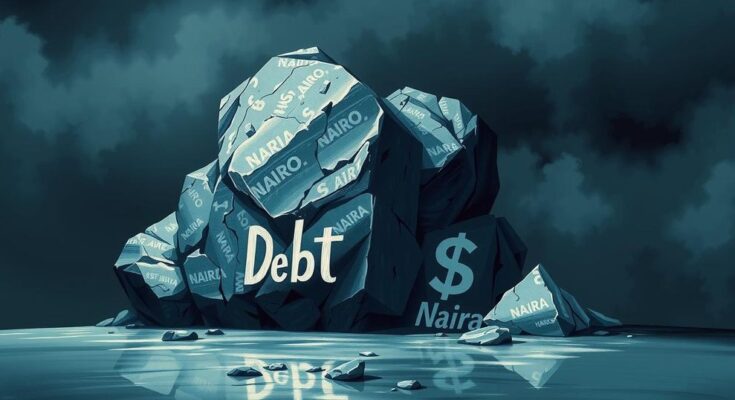President Bola Tinubu’s proposed foreign loans could push Nigeria’s public debt from N144.67 trillion to over N182.91 trillion by 2026. Economists express concerns over sustainability and debt management as Nigeria’s external debt nears $70 billion. The government aims to utilize these loans to support various key sectors but faces criticism regarding transparency and past borrowing efficiency.
Nigeria’s public debt seems poised for another major increase as President Bola Tinubu has requested approximately $24.14 billion in fresh foreign loans from the National Assembly. If approved, this new borrowing could elevate the nation’s total public debt from N144.67 trillion at the end of 2024 to potentially more than N182.91 trillion by 2026, based on the current official exchange rate of N1,583.74 to $1.
The breakdown of the loans includes $21.54 billion, €2.19 billion, and ¥15 billion. Under current market rates—a euro at $1.1381 and a yen at $0.0068—the euro comes out to around $2.5 billion, while the yen is about $102 million. This totals roughly $24.14 billion. When converting at the official exchange rate, the naira equivalent of these loans is estimated to reach N38.24 trillion.
As of December 31, 2024, the Debt Management Office reported that Nigeria’s total public debt stood at N144.67 trillion, nearly a 49% increase from N97.34 trillion a year earlier. This dramatic rise has been largely driven by significant increases in both domestic and external borrowings, exacerbated by the naira’s depreciation against foreign currencies.
The local currency’s weakness has dangerously inflated the value of Nigeria’s external debt, which surged from N38.22 trillion ($42.5 billion) at the end of 2023 to N70.29 trillion ($45.78 billion) by the year’s end, a staggering rise of nearly 84%. Domestic debt also climbed from N59.12 trillion to N74.38 trillion during the same timeframe, an increase of 26%.
Specifically, the Federal Government’s share of debt rose from N53.26 trillion to N70.41 trillion, while states and the Federal Capital Territory’s debt decreased from N5.86 trillion to N3.97 trillion, signaling a more cautious approach among subnational governments. Should the new borrowing gain full approval, external debt is projected to escalate to roughly $69.92 billion representing a 52.7% increase, potentially bringing the naira component of Nigeria’s total public debt above N108 trillion.
President Tinubu detailed that this external borrowing request is part of the 2025–2026 rolling borrowing program and is designed to bolster critical sectors like infrastructure, healthcare, agriculture, and education, among others. In his letter to the House of Representatives, he highlighted that these projects had gone through economic analysis to ensure they would spur growth and job creation.
In addition to the $24.14 billion in foreign loans, Tinubu has also sought to issue a $2 billion foreign currency-denominated bond in Nigeria’s domestic debt market under the 2023 Presidential Executive Order on Foreign Currency Denominated Financial Instruments, which aims to fortify the domestic financial market and stabilize the naira.
However, economists are sounding alarms regarding the sustainability of Nigeria’s debt. Johnson Chukwu, CEO of Cowry Assets Management, emphasized the importance of utilizing borrowed funds effectively. He noted, “The most important thing is what the money is being used for, and that’s what Nigerians will be focused on.” He expressed concerns that mishandled funds could exacerbate the nation’s financial burden.
Dr. Muda Yusuf, CEO of the Centre for the Promotion of Private Enterprise, echoed similar worries. He cautioned that a spiraling debt service burden could overwhelm essential government functions, saying, “Debt service is already far more than the appropriation for capital spending.” Yusuf urged for a sharper focus on generating revenue and reducing existing debts rather than acquiring new ones.
Experts also discussed a separate proposal for a N758 billion bond aimed at settling pension liabilities under the Contributory Pension Scheme. While Professor Segun Ajibola from Babcock University described this measure as long overdue, he advised against allowing the Central Bank to print money as a means to compensate for these debts.
The Peoples Democratic Party, along with former Vice President Atiku Abubakar, has criticized the loan request sharply, branding it as irresponsible. They insist the National Assembly and the public hold Tinubu accountable for his administration’s previous borrowing records. Debo Ologunagba, the PDP’s National Publicity Secretary, has insisted the populace must demand accountability and reject the bill when it comes to vote.
Amidst proposals and criticisms, economic analysts urge for tighter scrutiny of borrowing plans, warning that the burden of debt needs serious attention to ensure it does not lead to a fiscal crisis.
As Nigeria navigates its precarious financial landscape, President Bola Tinubu’s request for an additional $24.14 billion in foreign loans could significantly raise the country’s debt levels. Economists warn of potential risks associated with such borrowing, urging a focus on transparency and efficient use of funds. Amid soaring loan commitments, the government must tread carefully to avoid exacerbating the already strained fiscal environment.
Original Source: punchng.com




